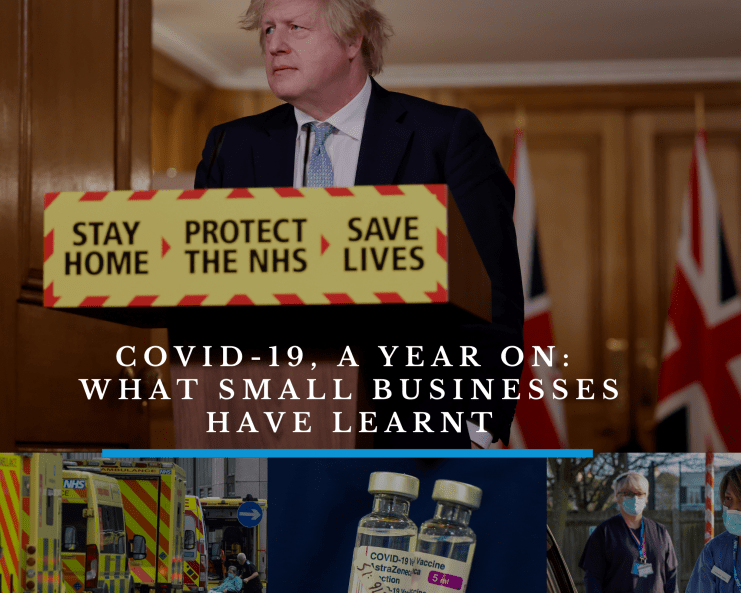Covid-19, a year on: What small businesses have learnt

In this series, City A.M. looks back at the last year of the pandemic and Covid restrictions and takes stock of its impact on industries and issues at the heart of British society.
Read more: Read the full Covid-19, a year on series here.
Some you win, and some you learn. Small businesses have certainly been “learning” by the bucketload in the last year. There have been some stellar success stories, but for the most part, the last year has been back to school the hard way for business. Although painful to go through, it will be the bedrock of recovery and future growth.
If we look back to the world before Covid-19, hard as it is to imagine now, the start of 2020 brought with it the optimism of a new decade, and millions of businesses made a plan for the next year in the happy expectation of new opportunities.
Pre-pandemic, many small businesses inthe UK had fallen behind comparable developed nations in some key metrics: digital skills, productivity, management skills. The pace of change in this was starting to pick up, but there was no dire urgency felt as 2020 progressed.
Until March 23rd 2020. The weeks leading up to this had seen a sudden drop in footfall and cafes, restaurants and shops had started to panic. Other sectors were quick to follow. A new way forward was needed, but for many they just did not have the digital skills or mindset to make plan B.
Business owners lost sleep, savings, staff and a new model for working did not arrive without pain. For some, pivoting their model online, dramatically reassessing costs and the fundamentals of their business came naturally, and the speed of movement meant they could be back up and running in a short period of time. For many businesses, this was not such a clear path. Where does you even start when years of work and investment now lie dormant and things that have always worked in the past no longer do?
Where businesses turned was online. Locked in their homes, with customers locked in theirs, a new way of communicating, selling and even delivering business was needed, and fast.
At Small Business Britain, we had already launched a partnership with BT’s Skills For Tomorrow to deliver free digital skills training to small businesses, and it took off like wildfire. Once the initial mourning period passed, that entrepreneurial spirit raised back up and took on the opportunities of a new, more online landscape.
Much of this was by trial and error, and the ability to fail fast was a key skill that took time to get comfortable with. Once a new route to market was found, businesses had to keep a dispassionate distance from it, certain in the knowledge that the world could, and would, change again.
As we opened up, and locked down, repeatedly, small businesses have had to flex time and time again. But now it seems they have got good at it. Trial and error created a transformed business landscape in the UK where even the most die-hard offline businesses started to engage.
Starting with the critical need for cash, sales opportunities grew rapidly and creatively. Businesses have exploded on social media, with platforms such as Shopify going crazy as small businesses sought to make the most of available spend. This has been followed up by cost and time saving – automation of marketing communications, of finance functions, and online collaboration tools have enabled a whole new era of flexible working, bringing with it unanticipated benefits. These benefits have been felt, most excitingly, by the natural world.
Supply chains, increasingly, became more local. Less travel and more digital working have had profound benefits for the environment. Small businesses have moved themselves closer to a net zero goal, and that is certainly a silver lining to come out of this. What we see now is businesses coming up for air and finding that they can share these climate change benefits with their customers. This is building a beneficial snowball of shared values, and it is only going to get bigger.
So, Covid-19 has managed to do what years of intervention from government, business organisations, business schools and more could not: create a more productive business landscape. We knew what was needed but getting small businesses to shift in this monumental way took a crisis.
It is not a way we would have wanted to change, and many will have felt unbearable pain in the process. As well as the lives lost and irreparably damaged by Covid, many people will lose their jobs and many more have experienced extreme mental health distress along the way.
But as we approach the beginning of the end, there is hope to be had. More resilient businesses with greater digital skills and the knowledge that they have come through the fight of their lives will form the basis of economic recovery in the UK.
These stronger businesses will be the ones that grow employment, that foster innovation, that create exciting, positive opportunities for communities and the planet: the great hope for the next decade.